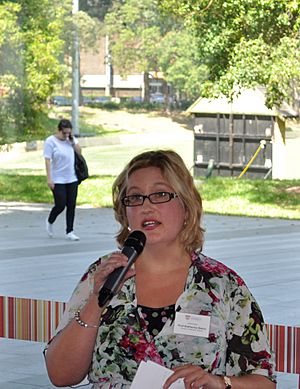Katherine Belov facts for kids
Quick facts for kids
Katherine Belov
AO FAA FRSN
|
|
|---|---|

Katherine Belov in 2014
|
|
| Born | 1973 (age 52–53) Sydney, Australia
|
| Awards | The Australian Institute of Policy and Science (AIPS) Tall Poppy award (2008), Received People's Choice Award, at the 20th Australian Museum Eureka Prizes (2009), Australian Research Council Future Fellowship (2009), Australian Museum Eureka Prize for Research and Innovation, Environmental Research (2011) |
| Academic background | |
| Alma mater | Macquarie University |
| Academic work | |
| Institutions | The University of Sydney |
| Main interests | Genetics, genomics, marsupial and monotreme genomics, evolution of the adaptive immune system |
| Notable works | Genetics of Tasmanian devil facial tumor disease |
Katherine Belov, born in 1973, is an Australian geneticist. She is a professor at the University of Sydney. She studies the genes of animals, especially Australian wildlife. Her work helps us understand and protect animals like Tasmanian devils and koalas. These animals are facing threats from diseases.
Professor Belov leads a research group called the Australasian Wildlife Genomics Group. She has shown that marsupials, like kangaroos, have very strong immune systems. She also helped map the genes of the platypus. Her research has helped find out why Tasmanian devils get a serious contagious cancer. She is also a big supporter of Women in STEM, encouraging girls and women in science.
Contents
Biography
Early Life and Education
Katherine Belov was born in Sydney, Australia, in 1973. Her parents were immigrants from Russia. She grew up in West Ryde, New South Wales. She first studied human genetics at Macquarie University.
Her professor, Des Cooper, encouraged her to study animal genetics instead. She started by studying grey kangaroos. Soon, she focused on marsupials. At the time, some thought marsupials had simple immune systems. Katherine Belov proved this idea wrong. She showed that their immune systems are complex, much like our own. This research inspired her to get her PhD. She earned her PhD in marsupial immunology in 2002. After that, she worked at the Australian Museum.
Discoveries About the Platypus
In 2004, Katherine Belov was part of a big team. This team worked to map the entire set of genes (the genome) of the platypus. Over 100 scientists from around the world helped. Their findings were published in the science journal Nature in 2008.
They discovered that platypuses have special substances called anti-microbial peptides. These peptides can fight many types of bacteria and viruses. They might even help fight serious infections in humans. Professor Belov's team continued to study platypus venom. Platypus venom can cause severe pain to humans. Her team found many toxins in the venom. These toxins are similar to those found in snakes, spiders, and lizards.
Research on Tasmanian Devils
In 2007, Professor Belov became a lecturer at the University of Sydney. She started focusing on a serious problem: devil facial tumour disease. This is a contagious cancer that has been spreading among Tasmanian devils since 1996.
She worked with other scientists to understand why devils couldn't fight this cancer. Professor Belov proved that the devils' bodies don't recognize the cancer as a threat. This is because the cancer's genes are too similar to the devils' own genes. This means their immune system doesn't attack the cancer cells.
Continuing Research and Recognition
Katherine Belov became a full Professor of Comparative Genomics. She received an Australian Research Council award. This award helps her continue her research. She studies genes in devils, platypuses, and other Australian animals. These include skinks and wallabies. In 2014, she received the Fenner Medal for her biology research.
In 2016, she took on a new role at the University of Sydney. She became the Pro-Vice-Chancellor for Global Engagement. This role involves managing the university's global partnerships.
Her team made important discoveries in 2016. They found that substances in Tasmanian devil milk can kill dangerous bacteria and fungi. This is a big step in fighting "superbugs" that are hard to treat. They also found new genetic differences in a group of Tasmanian devils in the remote South West.
Professor Belov has written over 170 scientific papers. Her team, the Australasian Wildlife Genomics Group, studies the genes of Australian wildlife. They focus on the immune system and how genes help with conservation.
She continues to promote Women in STEM. She is also part of the University of Sydney's SAGE Advisory Council. In recognition of her work, she received the Officer of the Order of Australia.
Honours
- 2008 – The Australian Institute of Policy and Science (AIPS) Tall Poppy award
- 2009 – People's Choice Award, at the 20th Australian Museum Eureka Awards
- 2010 – Sydney Magazine Top 100 most influential Sydney-siders
- 2011 – Eureka Awards Research and Innovation, Environmental Research, The Devils' Advocates
- 2014 – The Genetics Society of Australasia "Ross Crozier Medal"
- 2014 – Australian Academy of Science, Fenner Medal for Research in Biology
- 2018 – Fellow of the Royal Society of New South Wales
- 2019 – Officer of the Order of Australia
- 2022 – Fellow of the Australian Academy of Science
- 2024 – University of Glasgow Honorary Doctor of Science (DSc)
See also
 In Spanish: Katherine Belov para niños
In Spanish: Katherine Belov para niños
 | Calvin Brent |
 | Walter T. Bailey |
 | Martha Cassell Thompson |
 | Alberta Jeannette Cassell |

